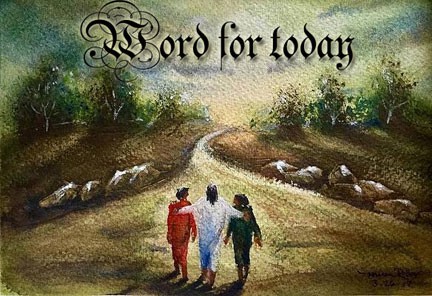Watch
Events
Articles
Market
More
It's funny how we have so many safety precautions these days. In a lot of cases I would say they are good yet in some cases they should not be a requirement.
When I was little my dad was a pastor in the Sabbath keeping church. We drove all over the country in a Volkswagen beetle. Everything we owned fit inside of that car. The backseat was filled with things and my younger sister and I rode on top of The things in the backseat without child seats.



Would you be pleased to hear some of my playlist and let me know your favourite song on it?
Our Father, Boundless Beyond Thought
by Dr. Garth Grenache
and His Uncanny Valley Orchestra
2024:10:21
Our Father, boundless beyond thought,
His Spirit's work in all we see,
His Word, His Wisdom forth He brought,
Surpasses mortal minds' decree.
Yet knowing well our human frame,
He grants a task both clear and plain:
To seek His face, to praise His name,
Through Scripture's truth, our hearts to train.
In prayer we bow, His Word we read,
Our minds engaged, our spirits stirred,
Obedience grows from planted seed:
We contemplate His holy Word.
With humble steps we walk His way,
Our Father's Spirit ever near,
His simple duty day by day:
To know Him more, to hold Him dear.
Complex beyond our mortal ken,
His works surpass all human thought.
Yet simple is our task as men:
To heed His Word, with duty fraught.
To love, obey, His will to seek,
And in His Scripture, meet our King.
Though we are frail, and He unique,
Our path is clear, our hearts can sing.



102124
WORD FOR TODAY “today is the day humanity was born again”: What is today’s date on GOD’S calendar? Friday evening began the 15th, Saturday evening the 16th, Sunday evening 17th. Today this happened; Gen 8:4 On the seventeenth day of the seventh month the ark came to rest on the mountains of Ararat.
SPOKEN VERSE FOR TODAY: Pro 18:6 A fool's words get him into fights; yes, his mouth calls out for a beating.
“Faith comes by hearing” positive frequencies spoken out loud hourly.
www.BGMCTV.org




One common rebuttal when giving my testimony of walking out the Torah is Galatians 5:4. I’ve covered Galatians as a whole before and how you have to understand Paul’s terminology in this book to understsnd the premise. One of those terms is “circumcision”. He isn’t speaking against the act, nor the Law.
We see him going to Galatia in Acts 16 & 18. In Acts 20, he visits James and James tells him of the rumors being spread about him that James knows isn’t true. Those rumors? That Paul was speaking against the Law and circumcision.
If Paul was to have truly not taught against these things in Acts, affirmed he didn’t with James, then later wrote a letter to Galatia saying the exact opposite; wouldn’t that make Paul a liar and untrustworthy?
Peter tells us in 2 Peter 3:15-17 that Paul is hard to understand and that the unlearned will twist them into not obeying the Law.
So, if Paul isn’t speaking against the Law or circumcision, what is he speaking against? The same thing Jesus/Yeshua was in Mark 7. Those groups that are hanging onto traditions and just trying to get someone to circumcise into THEIR faith to show they are growing. We have an account in Acts 15 with this group as well.
One of the traditions to join into Judaism then, and from my understand still today, was you first had to be circumcised.
It is a lot like baptism in many churches. How many church gatherings or posts have you seen where they are boasting “we baptised X amount of people today”. What are they doing with those people afterward? Are they growing them and teaching them to walk in the faith? Or just looking for the next person to baptize?
The point of Galatians is this: Don’t be another number for some man and their traditions. Choose the freedom Yeshua showed you in HIS walk: the Law. It is God’s plan for our best life (Ecclesiastes 12:13)
https://thestraightandnarrow.cfw.me/comics/852
#bible #biblestudy #webcomic #cartoon #christian #church #messianic #hebrewroots #wwjd



https://storage.googleapis.com..../production-ipage-v1
Question Everything
https://templecrier.com/library




Here is First Fruits Ministries sermon for 10/19/2024, called "Yeshua, Open Our Understanding": https://firstfruits.cc/blog/20....24/10/21/yeshua-open



David Martin
Delete Comment
Are you sure that you want to delete this comment ?